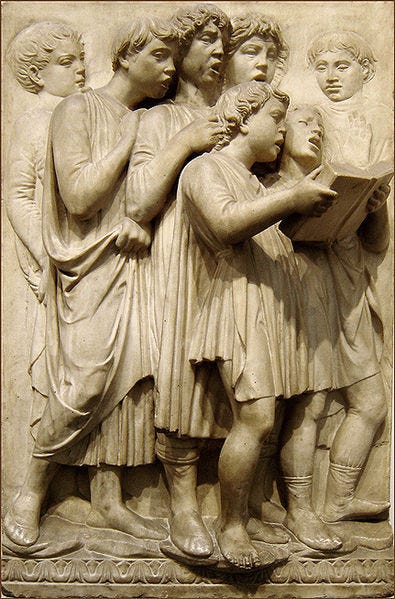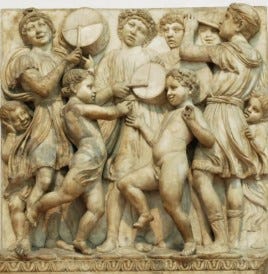Paedocommunion? A Simple Experiment to Test Your Views

See other posts in this series:
Part 2: Paedocommunion? – Saved by Some Kinda Faith or a Nuther

15 C. from the Cantoria by Luca della Robbia
AN EXPERIMENT ABOUT WHAT YOU THINK THE BIBLE IS SAYING
Is true faith a normal expectation for Christians to have of their infant children? Today I offer you an experiment to test this question. You can find the instructions for the experiment at the last portion of this post.
If you and your wife or husband have been deliberating over the idea of paedobaptism or paedocommunion, it is likely that the question of infant-faith has arisen. Can an infant be faith-filled? Does the Bible teach us to feel a certain way about this?
I would like to help you cross a hurdle today – or to remove one significant barrier from your path. I want to show you that the Bible teaches you to teach your children that the norm in the church is for faith and salvation to belong to the children of believers. We must confess that infant faith is the norm…from the womb, no less. And we can show that from the Bible. But first, a word on where we are going.
When I am driving my family somewhere new, or if we are walking through a place we don’t know, my wife, understandibly wants to know 1) Where we are going, and 2) how far to the destination. Sometimes when I start rambling in a conversation in the kitchen, my wife says, “I can listen, but I need to know where we are going, and how far!!” So before I start a-talkin’ I want to let you in on the future scope of posts in this category.
WHERE ARE WE GOING?
I wish to deal as fully as possible with the topic of covenant and children. But that’s a big topic. I believe that to properly handle the topic of baptism or participation in the Lord’s table, we need to discuss three related, controversial topics: paedofaith, paedobaptism, and paedocommunion. Can infants have faith? Should infant children of Christians be baptized? Should baptized children also be participating in the Eucharist, even before they can articulate the articles of the faith?
HOW LONG WILL IT TAKE?
Is this a one post hit and run? No — there is so much to say, it’s going to be a regular string of posts. And here is a basic, beginning agenda: I want to first lay some groundwork for all three of the above categories in that same order: 1) faith, 2) baptism, 3) communion. But after that, I may feel free to move around these interrelated topics.
A PREVIEW OF MY OWN VIEWS
I believe the Bible says children of believers are to be treated as believing Christians. Of course, that is, until or unless they should later display apostasy, confirmed by church disciplinary excommunication (which we don’t quickly declare over any brother, since the process of admonition and attempted restoration is a long one). And we don’t expect apostasy as the norm. I believe we are commanded to baptize and to share the table with our small Christians, and that we are not just doing this willy-nilly, but we do this as natural because the Bible also explains that they are normatively expected to have faith from the womb.
All of this remains to be seen, of course. You don’t have to crumple in submission to these claims, of course. We check the Bible, of course. But I think that there is a substantial amount of satisfying and clear material straight out of yonder Bible, such that I won’t even have to make anything up!
DIFFERENT VIEWS IN THE CHURCH
I know that I am talking to three disparate groups: baptists, modern-paedobaptists, and paedocommunionists. But before I can continue, a caveat. I do not expect all the posts to be as long as this one, because today I am introducing a lot of material, but this post has a following background section, and then a devotionally oriented, Bible encouragement. If you are mainly interested in seeing what biblical encouragement I have to offer today, but are not wanting your brain to explode with details of each group listed, then I suggest you skip down to the heading below that says, “THE BIBLE TAKES A SIDE.” If you want to see who I think the parties are in the argument, then here is my description of the groups:
1) Baptists believe we may not confirm God’s covenant with anyone before a manifest profession of their own comprehension of the faith. Generally speaking, this group includes most non-denominational Christians, and also those believers whose denominations use the name “Baptist.” It would also generally include “Bible churches.” People with this view, those who are already involved in arguing for this view, prefer to call themselves “believer’s baptist” or “credobaptist.” But an efficient and historic term is “baptist,” which I prefer over “credobaptist.” I will grant my credobaptist friend have a right to such a term, but since my position is also that we may only baptize believers (including infant believers), I am less fond of giving up the goods by allowing that term to be canonized in a way that excludes paedocommunionists. With credobaptists, I am not arguing that children must have faith first – on that we agree. With credobaptists, I am asserting that the Bible demands us to expect infant faith out of our preborn children. But you may see me say either “baptist” or “credobaptist” in the future of these posts. It may be safely said that the argument between credobaptists and infant-baptists is usually between baptists and presbyterians – who often find themselves allied as evangelical partners in most other areas.
2) Modern-Paedobaptists (an arbitrary term I am setting up in order to distinguish between #2 and #3). “Modern-Paedobaptists” are people who believe we may confirm the first sacrament (baptism) but not the second sacrament (the Lord’s Supper) as appropriate to a child born to Christians before a manifest profession of their own comprehension of the faith. This was the position of most of the Reformers, including Calvin; and it is the denominational position of most Presbyterian groups, and also of most Methodists, Lutherans, Roman Catholics. A special note may be given to Anglicans whose basic standards are written this way, but whose majority practice is more like #3 to follow. It may also be safely said that the main argument between infantbaptists and infantcommunionists is frequently or usually between two factions of conservative presbyterians. Both sides agree on baptising their children, but the modern-paedobaptists presbyterians are happy to follow Calvin in this argument. And of course, it is easy to want to go with Calvin in an in-house presbyterian argument. Infant baptism in general is the older view between #1 and #2. But the infant baptism that rejected children from the table was formalized around the same time as the emergence of anabaptism in the time of the reformation.
3) Paedocommunionists are people who believe we must confirm God’s covenant within our children, first by baptism, and then when they are able to eat, by the meal. This group is smallest now, but historically this view was antecedant to #2 and #1. I will argue not only that this is the view (in principle) of the Old Testament, but is demonstrably the command of Paul. It is the practice that was used from the earliest church up through the first millennia. It was a pillar of the reform attempts of Jan Hus (John Huss), who tried to bring infant communion back as a return to the standard old-way of the church. It has always been the practice of the Eastern Orthodox churches. It is the current majority practice of Anglicans to allow baptized children to commune. There is a growing group of Presbyterians and Anglicans who are teaching this view theologically, and not by the mere accident of lazy practice. It would be safe to indict Kuyperian Commentary as a Paedocommunionist group, but it would be unsafe to assume that any contributing scholar is necessarily included in this grouping. Let me say happilly, we all have baptist (#1) friends, and many modern-paedobaptist (#2) friends – people who greatly bless us in spirit and formation.

Also from the Cantoria by Luca della Robbia, 15th C.
—The Encouraging, Bible Part of the Post—
THE BIBLE TAKES A SIDE
This post will not be my only post that will argue this view – that the Bible says that we must treat our Children as nascent Christians. I will focus on the Psalms today, and in a future post on Jesus laying hands on the children. In fact I have already envisioned other, shorter posts which will be centered on other quick “Bible Experiments” to help elucidate what you think a given text must mean on the topic of children and covenant.
A GRAND EXPERIMENT – FOR REAL!
Today I want to propose a grand experiment, I want to suggest an actual experiment for finding out what you think the Bible says and means on this subject. The only items you will need for this experiment are your children and a Bible.
I am going to ask you to read sections out of three Psalms out loud with your children, and ask yourself whether you and your children can read these without the expectation of normative faith in infants of believers. Can the covenant community have survived for 1000 years from David to Jesus without having held to such a view? Don’t these verses both teach and demand that we corporately confess such a view?
If you have already baptized your children, I can only imagine you are allowing your children to sing the Psalms. If you are from a baptist camp who sees children as necessarily non-saved, then say these sections outloud to yourselves, and then ask yourself why you believe children to be excluded from the faithful.
But remember, that as the church sings the Psalms, we are confessing them to be God’s word and not an opinion.
You can easily print out the sections by following this link, or just leave the screen open to where everyone participating see it.
So here goes (all passages are ESV):
Psalm 22:9-10
9 Yet you are he who took me from the womb;
you made me trust you at my mother’s breasts.
10 On you was I cast from my birth,
and from my mother’s womb you have been my God.
Psalm 71:4-6
4 Rescue me, O my God, from the hand of the wicked,
from the grasp of the unjust and cruel man.
5 For you, O Lord, are my hope,
my trust, O Lord, from my youth.
6 Upon you I have leaned from before my birth;
you are he who took me from my mother’s womb.
My praise is continually of you.
Psalm 8:1-2
1 O Lord, our Lord,
how majestic is your name in all the earth!
You have set your glory above the heavens.
2 Out of the mouth of babies and infants,
you have established strength because of your foes,
to still the enemy and the avenger.
–end of experiment–

Monks and Children Singing in art from the Tacuinum Sanitatis – (not a Christian work)
These verses are far from the sole reason to hold such views, but I have, over many years, found them to be a great source of weighty reason to trust the good promise of God which is also found elsewhere many times over.
Before we leave the topic of infant-faith, we will in the next post look at Jesus blessing the children. And soon enough there will be some other experiment-style posts. If you have an interest in this topic, please keep checking back!
—
Luke Welch has a master’s degree from Covenant Seminary and preaches regularly in a conservative Anglican church in Maryland. He blogs about Bible structure at SUBTEXT. Follow him on Twitter: @lukeawelch<>нужен копирайтер украинараскрутка а в поисковике
The post Paedocommunion? A Simple Experiment to Test Your Views appeared first on Kuyperian Commentary.

